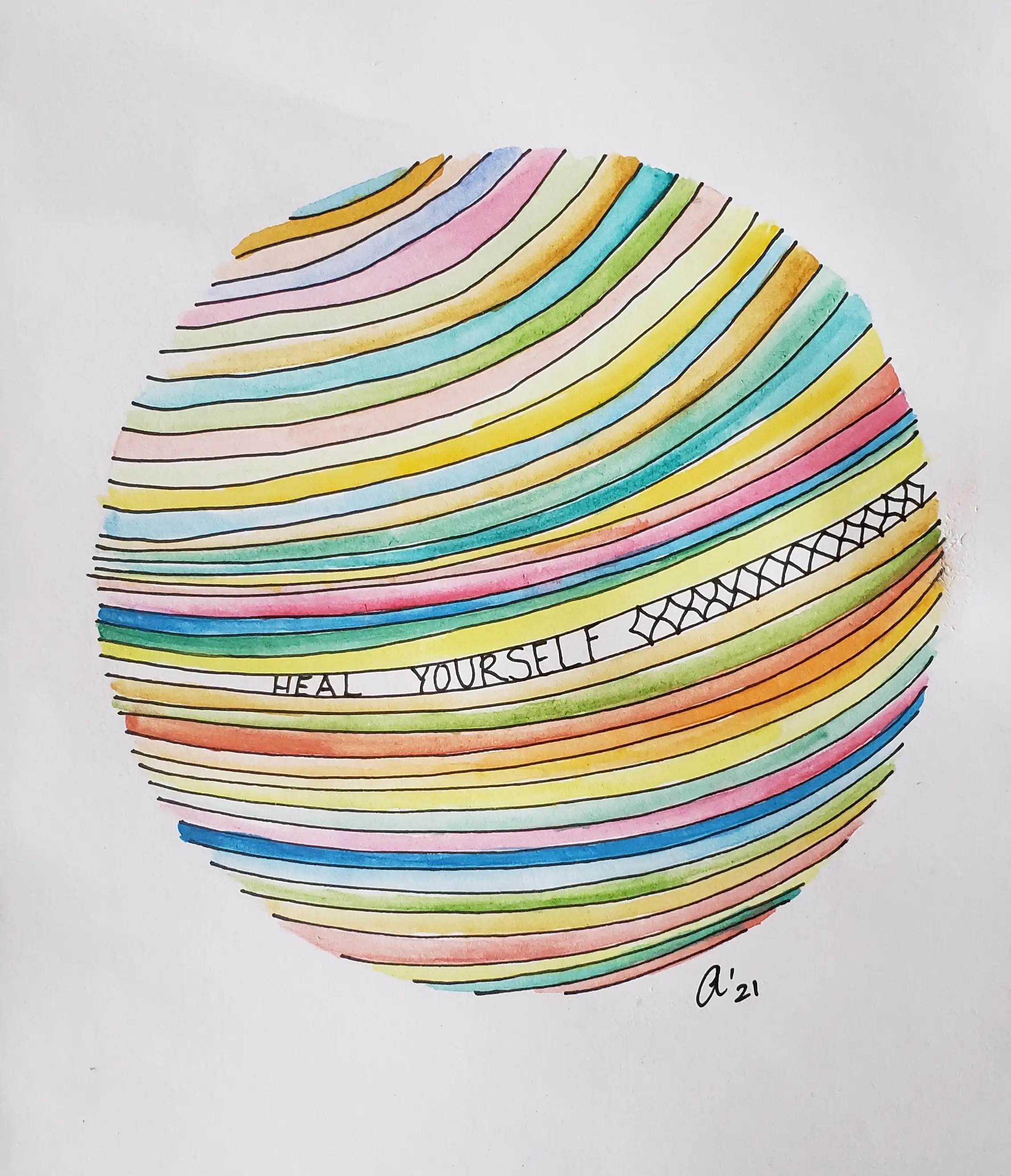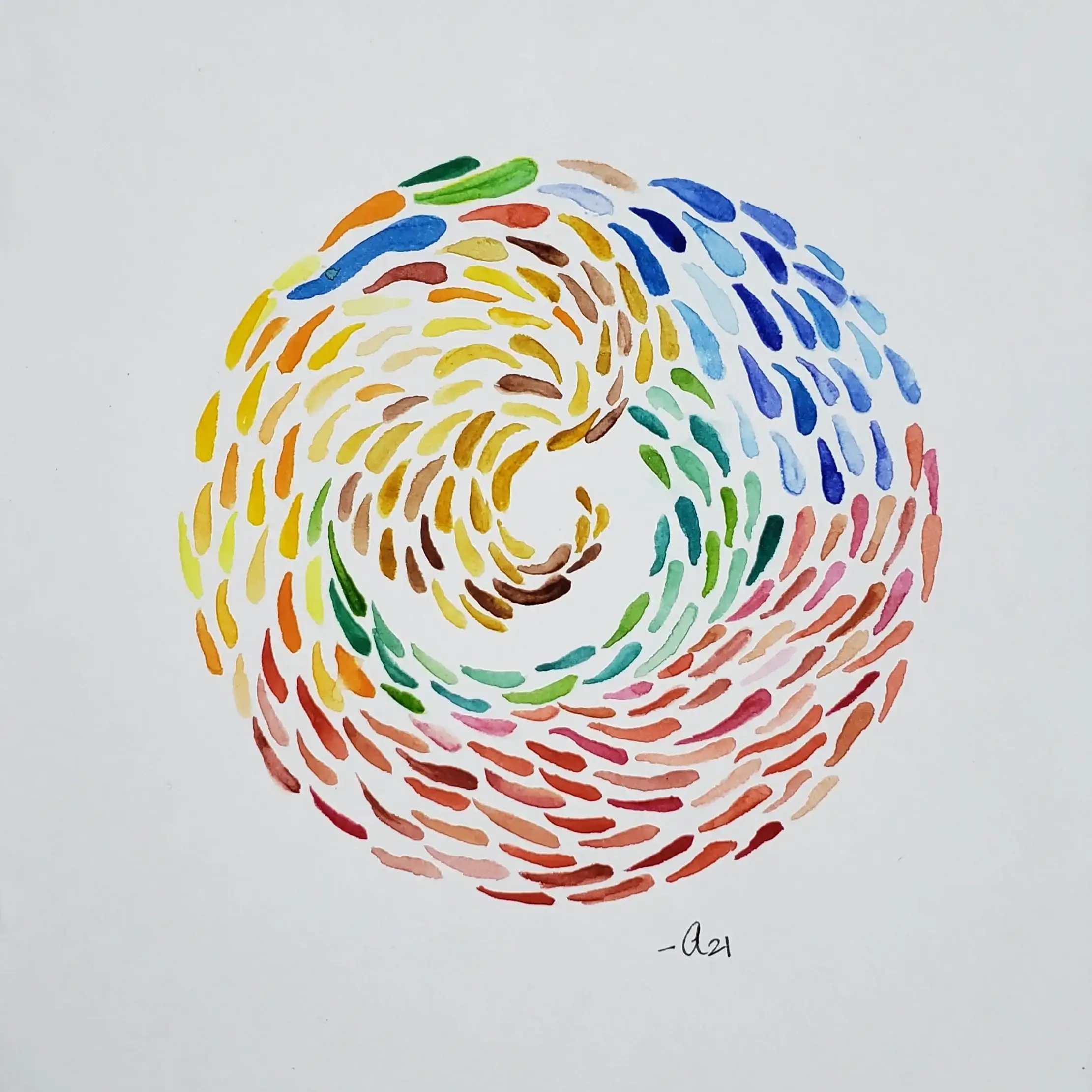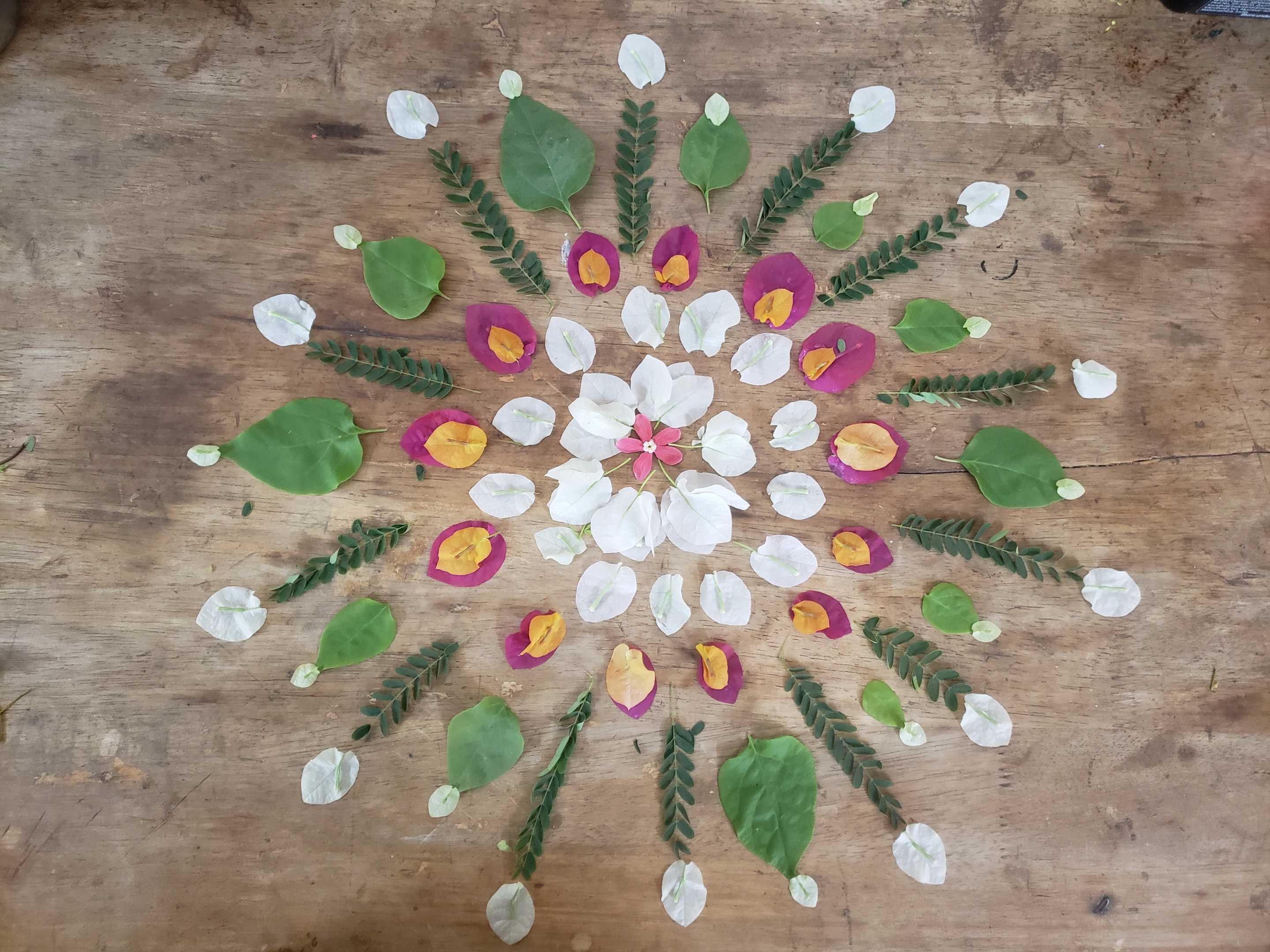The closed form of the 'circle' or the mandala has been intrinsically alluring to the human mind across cultures, age groups, and beyond time. "Mandala" is a Hindi word derived from Sanskrit, meaning "circle" or center. For centuries, the mandala has been used in Eastern cultures as a spiritual and meditative symbol. It is considered a symbol representing the universe. Research in recent years has confirmed the healing potential of the mandalas, as they promote mental and physical well-being across various populations, especially for those experiencing stress, anxiety, and depression. They have been incorporated into art therapy as an intervention tool to increase self-awareness, promote self-expression and insight, reduce stress and anxiety, foster positive emotions, and enhance overall well-being. Mandala art therapy may include mandala coloring, mandala drawing, or mandala meditation, each contributing uniquely to promote relaxation and healing. Although creating mandalas for self-care and healing can be beneficial, "mandala art therapy" as an intervention is a goal-oriented process. It is facilitated by a trained and qualified art therapist.

The modern mother is a true multitasker, juggling multiple roles and responsibilities and catering to the socioculturally learned demands of our patriarchal society. Mothers' mental health is often overlooked as they balance work and family responsibilities, navigate parenthood, and overcome daily societal challenges. The struggle to meet the expectation of "doing it all" usually leaves the mother with guilt, burnout, stress, and low self-esteem. Taking time for self-care can help reduce stress, promote overall well-being, increase emotional resilience, and enhance relationships. This article aims to introduce mandala art as a self-care tool and mandala art therapy as a modality to promote creative self-expression, cope with overwhelming emotions, and foster self-awareness and insight among mothers.
Expressing gratitude towards our loved ones can be far more impactful than just another gift. And such gratitude is best expressed through our actions rather than words. Investing in your mother's mental health will reap guaranteed positive rewards for her personal growth, emotional resilience, relationships, and quality of life. Sometimes, the most challenging thing is just getting started, which is why gifting an art therapy session wherein she can experience the art-making process firsthand would be the perfect gift!
In art therapy, the focus is on the creative process and not the final product. Art therapy will provide the mothers with a non-judgmental, safe space to freely express their emotions, thoughts, and concerns in a playful way through art.
Art psychotherapists use the mandala as a primary tool for self-awareness, self-expression, conflict resolution, and healing. It encourages a meditative experience and offers insights about the self and deeper meaning to life's situations. Unlike the popular understanding of the mandala as being geometric and symmetrical, within the realm of art therapy, the mandala generally refers to any art form that is done within a circular boundary. The content within the circular outline can be symmetrical, asymmetrical, abstract, or just a scribble. The circular boundary aids in the containment of powerful and complex emotions, which can be triggering or overwhelming to be expressed and processed through words alone.

The mere act of mandala making is therapeutic and can help reduce stress and anxiety levels. Creating repetitive forms and patterns within the circular boundary often leads to a meditative state called "the zone" or "flow," which focuses your mind, temporarily pushes aside all your worries, and relieves your stress. And how does being in such a "flow" state benefit us? Being in the zone or flow induces a relaxed reflective state, increases focused attention to the task and promotes a sense of pleasure. Creating mandalas engages both hemispheres of the brain, thus restoring a sense of mental and emotional balance. Such a cerebral balance brought about by the mandala enhances our ability to cope with anxiety, regain control, and feel more grounded.
As a tool for creative self-expression, mandalas offer a non-verbal outlet for mothers to express their emotions, thoughts, and experiences, which can be liberating and empowering. Through the process of making mandalas and processing them with an art therapist, mothers can process and work through difficult emotions, gain insights into their mental and emotional well-being, and develop solutions to overcome emotional disturbances and challenges. Mandala art therapy can also help mothers better understand themselves and their experiences, which can increase their self-awareness and self-acceptance. Moreover, engaging in creative activities such as mandala-making can foster a sense of accomplishment and boost their self-esteem and confidence. These positive emotions can gradually be translated to other areas of life outside of the therapy session. The self-awareness gained through creative expression and processing one's thoughts and feelings can promote emotional resilience and provide better clarity about one's needs and goals. Art therapy can also help mothers improve their relationships with their partners, children, other family members, and friends by working through their emotions and challenges and better understanding themselves.
Clinical studies have shown that mandalas boost the immune system, reduce stress and pain, lower blood pressure, promote sleep, and ease depression. Research has also found that daily coloring can reduce depressive symptoms and anxiety and be an effective, inexpensive, and highly accessible self-help tool for non-clinical populations. Studies show that 45 minutes of creating art in a studio setting with an art therapist significantly lowered cortisol levels or the "stress hormone." Regardless of one's age or experience, engaging in the creative process and viewing the finished artwork stimulates the release of dopamine, the "feel-good hormone," which lowers feelings of depression, increases confidence, and protects the brain from aging.
Research has also explored how mandala-making can help women cope with significant life transitions, such as entering motherhood or accepting menopause. Mandalas can be beneficial for new or expecting mothers to process and overcome anxiety and depressive symptoms. Furthermore, art therapy can also help new mothers explore their new identity as a mother and help foster a sense of competency through creative expression.
So, how can you incorporate mindfulness into mandala art therapy? By focusing on the process of creating mandalas and through repetitive and rhythmic hand movements, individuals can cultivate a state of mindfulness, enhancing their self-awareness and overall well-being. Mindfulness in mandala art therapy encourages mothers to observe their thoughts and emotions without judgment, allowing for self-reflection and a deeper connection with oneself. You can start practicing mindfulness by observing the natural mandalas in your surroundings. Try increasing your awareness by noticing mandala-shaped objects and their details. Once you look with a keen eye, you will find an abundance of mandalas in nature – lemons, oranges, flowers, shells, pinecones, snowflakes, and many more!
In addition to drawing or painting mandalas or coloring a preformed template, one can also make 3D mandalas from stones, sand, clay, or even found or natural objects such as leaves, twigs, or flower petals. Regardless of the materials used for creating the mandala, the process of moving your thoughts and feelings out of your body and onto a piece of paper or into a sculpture allows the creator to step back and distance themselves for deeper processing. The insights gained from the reflections guided by the art therapist post-art making are extremely valuable and lead to increased self-awareness and transformative change.

Mandala-making is an effective self-care tool for mothers as it is no mess, flexible, time-efficient, and requires limited materials. Even 10 to 15 minutes of undisturbed and focused engagement in mandalas creation daily can significantly positively affect mood, stress, anxiety, and self-esteem. To enhance the effects, one can also add music to the experience and play some soft, instrumental music in the background as they create their mandalas. Using different materials and artistic tools can also add excitement and anticipation to the process and stimulate creative ideas.
Indian women have been creating mandalas in the form of "Rangoli" or "kolam" for many years, and they have their own religious and spiritual significance. Practiced for ages and now empirically confirmed, the mandala can be an effective tool for women coping with the smallest day-to-day stresses, women struggling with mental or emotional disturbances, women battling with physical ailments, or women struggling with the challenges of aging.
This month, express your love for your mother by gifting her an art therapy session to help her feel relaxed, calmer, stronger, and brighter!
Disclaimer: Creating mandalas for self-care is not a substitute for seeking professional art therapy. Seeking professional help from a trained and qualified art therapist is advisable if you are experiencing extreme stress and anxiety affecting your daily work or functioning. Additionally, mandala making is only one of the interventions used in art therapy; it neither explains nor demonstrates the total capacity of art therapy. This article aims to introduce mandala making as a self-care tool and describe the benefits of mandala art therapy as a professional intervention. This article recommends against using the term "mandala art therapy" if practiced in the absence of the guidance and/or supervision of a trained and qualified art therapist.
Ashmi Seth,
Art Therapist & Counselor,
Mumbai, India
arttherapistashmi@gmail.com



